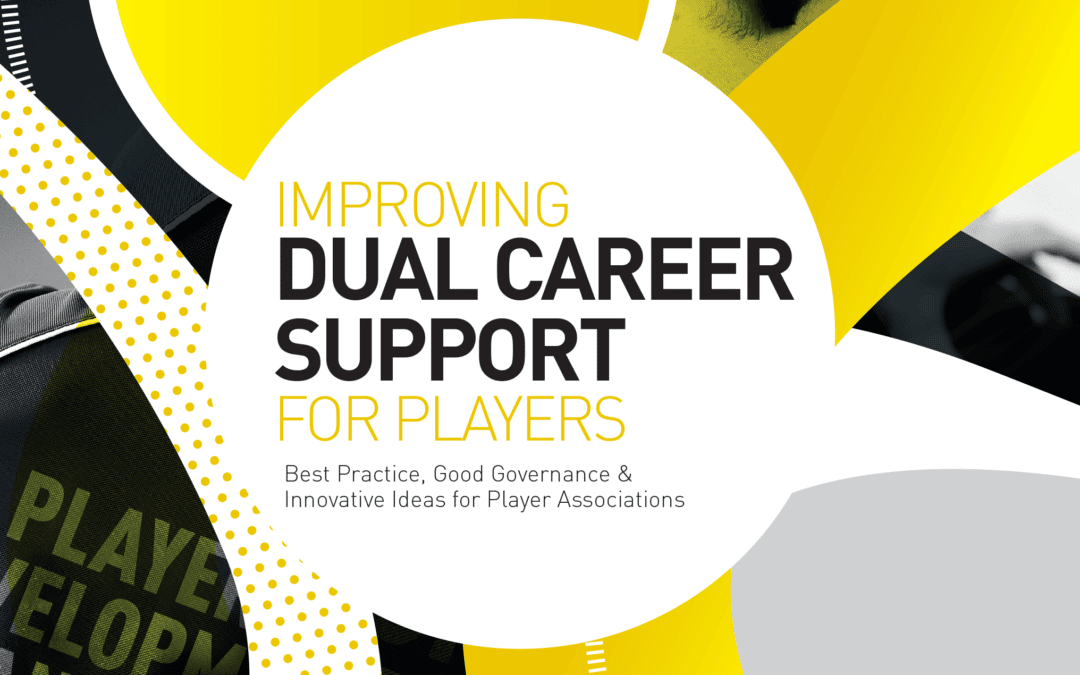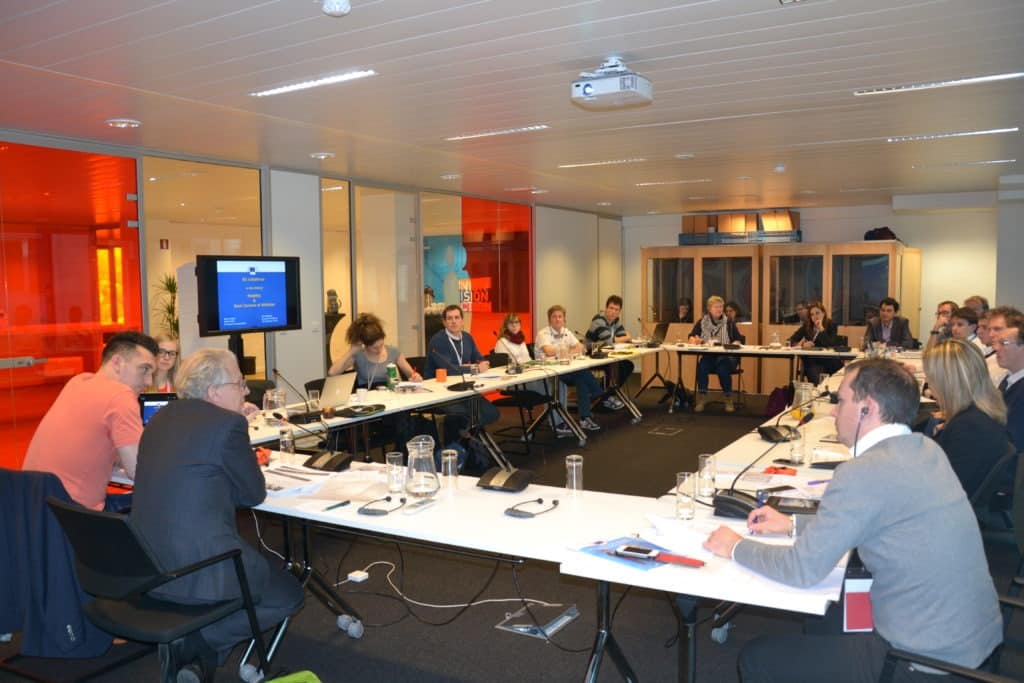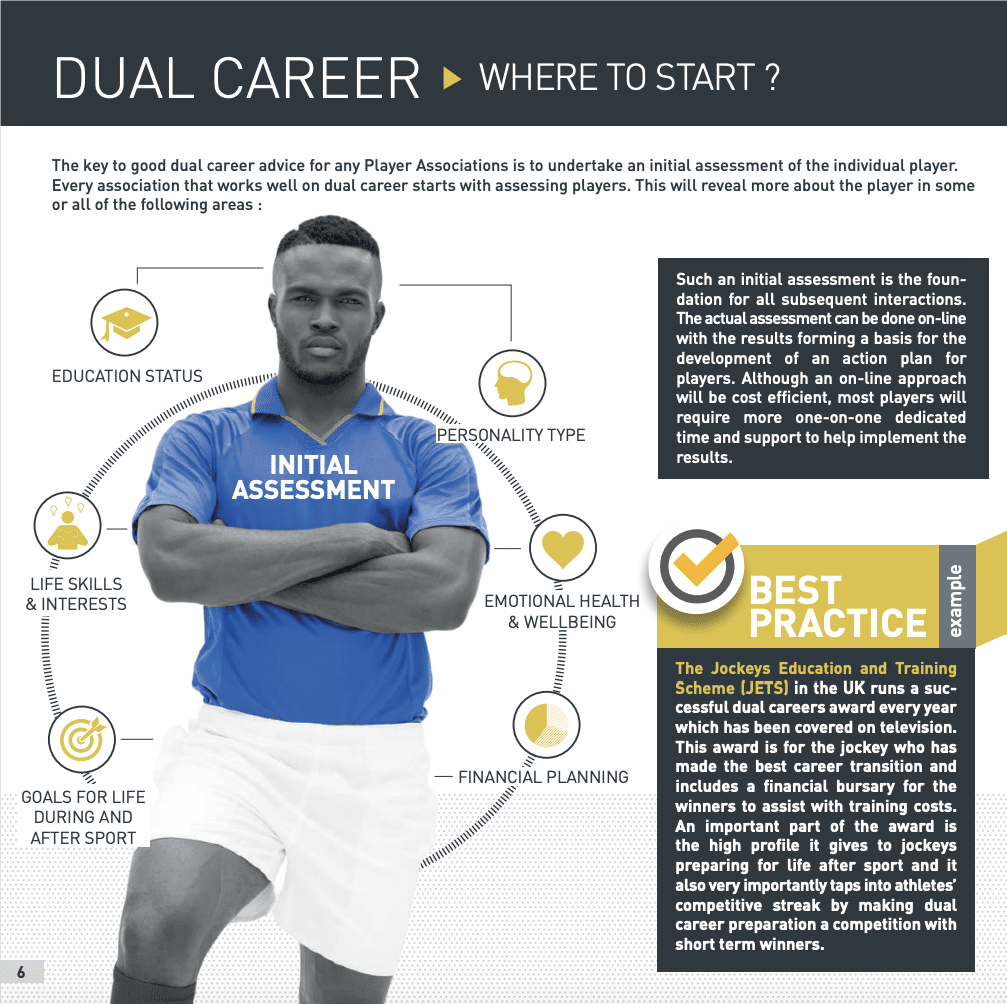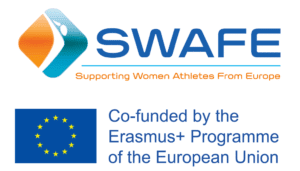
Dec 7, 2016
Improving Dual Career Support for Players
The project aimed to improve the way athlete and player associations in membership of EU Athletes offer support and advice on dual career to elite athletes in 12 countries. The participating associations increased their focus on dual career issues and equipped themselves to deliver related support to athletes and players.
Over the course of the project, the Best Practice governance model of Player Development Managers (PDMs) was agreed and promoted throughout the membership via the exchange visits, final dissemination conference and booklet designed for athlete and player associations.
The exchange visits allowed key staff to learn from different associations and improve their own services – both structurally and through the skill-set of staff. This was supported by a training seminar in February 2014 that maximised the usefulness and appropriateness of the exchanges.

In early 2015, a three day conference for all members of EU Athletes was held in Finland to share the best practice developed during the exchanges and to promote the concept of PDMs and EU Guidelines on Dual Career.
Finally, Dual Career Booklet on the PDM model of governance for athlete and player associations was produced and published in English. The document contains examples of good practice and is a powerful tool for promoting change in support provided for professional athletes.

Overall, the project promoted dual career support amongst the different associations in the membership of EU Athletes and led to the publication of the booklet which became a valuable learning tool for athlete and player associations, governments, and sports movement as a whole.
More downloadable materials, including the outputs of the PROLead project aimed at improving dual career opportunities for professional athletes, are available here.
‘Improving Dual Career Support for Players’ project, co-financed by the European Commission, started in January 2014 and finished in January 2015.

Dec 6, 2016
SWAFE project aimed at improving the support for female athletes that professional player associations in Europe provide. The small project included research of female athletes’ experiences and a study of existing player associations support for elite women athletes. A conference for 25 different associations was organised in Athens (June 2017) to examine the issues and difficulties that are specific to female athletes, find possible solutions, and share and develop best practice. A booklet was produced with the conclusions of the conference and this was disseminated across all the relevant stakeholders.
Before the project, there was little statistical research identifying the specific need for the player associations to improve their support for female athletes. A part of this small project was therefore designed to provide statistical evidence and develop a more formal and statistically rigorous specific needs analysis.
The need for effective player representation through organised labour is particularly important in sport due to the monopolistic positions of sports federations and the inherent cartels involved in professional leagues.
At the time of the project, there were less than a handful of dedicated women’s player associations within Europe. Part of the reason for this lack was the relatively new nature of the professional and semi-professional women’s sport within those (non-Olympic) sports with an established or developing organised trade unions.
EU Athletes is committed to bringing the European player associations together to work on areas of common interest with gender equality being one of its main priorities. At the 2015 and 2016 General Assembly of EU Athletes, it was agreed by the 25 member player associations that EU Athletes were to examine the issues of gender equality and help them to improve the support for women athletes.
Implementation programme :
1. Kick off meeting, January 2017, Spain
2. National research, February – March 2017, Spain, Ireland and Greece
3. Player Association research, February – April 2017
4. Preparation for Big Conference, May 2017, Greece
5. Big Conference, June 2017, Greece
6. Preparation of best practice guidelines, June to September 2017
7. Dissemination of best practice guidelines, September 2017
8. Follow-up research, October-November 2017
9. Wrap-up meeting, Ireland December 2017

2017 – SWAFE project
2017 – SWAFE – Improving player associations’ support for women athletes
Nov 3, 2016
Bye-law 3 to Rule 40 of the Olympic Charter states that “Competitors, team officials and other team personnel who participate in the Olympic Games may allow their person, name, picture or sports performances to be used for advertising purposes during the Olympic Games in accordance with the principles determined by the [International Olympic Committee] Executive Board.”
Following the developments related to the modification of the Olympic Charter’s Bye-law 3 to Rule 40 (Rule 40) and inquiries about its incompatibility with the European Union (EU) law, we would like to: note our opposition to the above-mentioned rule; emphasize our support for the European Commission for protecting athletes rights against the abuse and express an openness to a dialogue and negotiations on this matter.
Athletes that we represent are among those that are obliged to comply with Rule 40 in order to compete at the Olympic Games. Following the German Bundeskartellamt ruling earlier this year, it is increasingly clear the Olympic Rule 40 is in breach of the EU competition law. Despite the recent changes, Rule 40 remains unduly restrictive of athletes’ economic rights and their commercial opportunities.
Statement on Bye-law 3 to Rule 40 of the Olympic Charter
We are strongly of the opinion that Rule 40’s continued excessive restrictions are a result of the flawed decision-making process within the Olympic movement. Independent athlete associations, who do not support Rule 40, were excluded from the process. Mere consultation of athlete commissions, which are a part of the Olympic movement themselves, is unacceptable when it comes to rules that affect all athletes participating at the Olympic Games. By choosing to ignore independent athlete associations, the IOC’s approach is not compatible with the principles of good governance and the fundamental right of freedom of representation.
While the IOC indicates that the athletes should negotiate directly with their National Olympic Committees (NOCs), it is apparent to EU Athletes, and probably the European Commission, that it is Rule 40 itself that is under question as a source of infringement of athletes’ rights. IOC, as the leader of the Olympic Movement and organizer of the Olympic Games, must assure that the athletes’ rights are respected in this context. At the same time, the European Commission has a responsibility to help protect the economic rights of European athletes and is uniquely placed to do so by ensuring that sport organizations comply with EU competition law. It is unacceptable for sport organisations to abuse their dominant positions to pursue their own commercial interests to the detriment of the rights of athletes.
From our side, EU Athletes is committed to advancing the rights of the athletes in Europe and is committed to discussion and negotiation in order to reach a long-term solution that is compatible with the EU law and fundamental rights as well as the interests of the stakeholders.



Nov 2, 2016
The general objective of the PDM project was to improve the governance of the player associations members of EU Athletes with regards to how they support elite players prepare for their dual careers outside after sport.
This was done through improved organisational arrangements and also by improving the skills set of the associations staff.
We have developed and promoted a best practice governance model of Player Development Managers (PDMs) within the 27 player associations in membership of EU Athletes. PDMs fulfil one of the core remits of player associations through direct contact with elite athletes at their place of work. Their main role is to provide support and advice to players about education and preparing for the end of their sporting careers.
The project provided advice and guidance on good governance and dual careers to the 27 player associations in active membership of EU Athletes members. In so doing we improved the support and advice on dual careers which they provide to the 12,000 elite sportsmen and women that are their members.
An exchange programme for 19 player associations from 12 different countries allowed one of their staff (either a PDM or someone with a responsibility for PDMs) to spend three days with different player associations from across Europe. In so doing the project will improve the quality of current Player Development Managers and also help develop new PDMs.
The exchange programme was supported by a tailored training seminar in the Brussels to prepare and support the 19 people taking part. Everyone taking part in the exchange programme was required to prepare a brief written report after the exchange. Detailing what has been learnt and recommend improvements in their own associations on dual career support and governance.
These reports formed the agenda for a big, three day conference for all 27 members of EU Athletes hold in Finland towards the end of the project. As the attendees will vary in their development and governance models the conference included more specialist tailored sessions and breakout groups.
Finally we will produced model guidelines for player associations on best practice for the adoption on PDM models of governance and also on the promotion of dual careers. This booklet is based on the feedback reports from the exchange visits and the discussions at the large conference. It will be aimed at the player associations and their PDMs.
The Brussels training seminar, the large conference in Finland and the booklet have all promoted the relevant extracts of the EU Guidelines on Dual Careers of Athletes direct to the 27 player associations in membership of EU Athletes, such as
- the role of player unions as key deliverers of dual career programs,
- the inclusion of dual careers in social dialogue
- national cooperation of stakeholders (both sport and public bodies),
- developing adapted education modules
- and the qualification of dual career staff
Other softer goals of the project include the promotion of greater understanding and solidarity between different player associations across Europe; strengthening of the network of European player associations within EU Athletes; promotion of the results of the EU Expert group on good governance and dual careers; promoting greater European integration; and finally highlighting the European Commissions support for dual careers.








